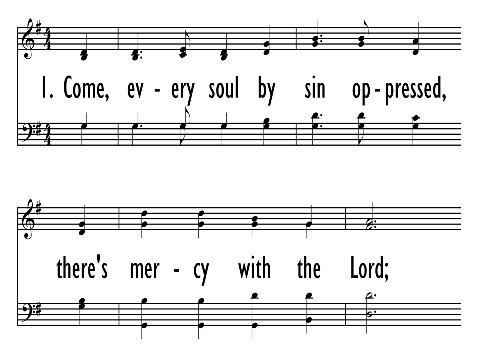- |
User Links
O Praise the Lord, for It Is Good
Hymn Information
- First Line
- O praise the LORD, for it is good
- Text Source
- <cite>Psalter</cite>, 1912, alt.
- Tune Name
- MINERVA
- Composer
- John H. Stockton (1874)
- Topic
- Music and Singing · Elements of Worship: Praise and Adoration
Copyright Information
- Text Copyright
- Public Domain
- Tune Copyright
- Public Domain
- Reprint/Projection Information
- Words and Music: The Words and Music are in the Public Domain; you do not need permission to project or reprint the Words and Music.
Full Text
Scripture References
Further Reflections on Scripture References
The people of Jerusalem (v. 2) become the "church" (st. 1) in this hymn-like versification of Psalm 147. With minor alterations in each stanza, the versification comes from the 1912 Psalter
Bert Polman, Psalter Hymnal Handbook
Confessions and Statements of Faith References
Further Reflections on Confessions and Statements of Faith References
The God who was active in providing his Son for our redemption, has also been active in the course of history and in the lives of his people. His activity in the course of history began when he created all things. Belgic Confession, Article 12 teaches that God, “when it seemed good to him, created heaven and earth and all other creatures from nothing, by the Word—that is to say, by the Son.” In addition, “God created human beings from the dust of the earth and made and formed them in his image and likeness.”
His activity also includes his constant care for all he has created. “…He watches over us with fatherly care, sustaining all creatures under his lordship” (Belgic Confession, Article 13). Additionally, God reveals himself by this “creation, preservation and government of the universe, since that universe is before our eyes like a beautiful book...” (Belgic Confession, Article 2).
We also believe that God’s mighty acts are revealed “in the unfolding of covenant history…witnessing to the news that Our World Belongs to God and he loves it deeply” (Our World Belongs to God, paragraph 33). Primary among these actions in the unfolding of covenant history is “the long road of redemption to reclaim the lost as his people and the world as his kingdom” (paragraph 18). As God’s people observe his work in their lives and in history they respond with praise and adoration.
O Praise the Lord, for It Is Good
Additional Prayers
O Praise the Lord, for It Is Good
Tune Information
- Name
- MINERVA
- Key
- G Major
- Meter
- 8.6.8.6 D


 My Starred Hymns
My Starred Hymns





